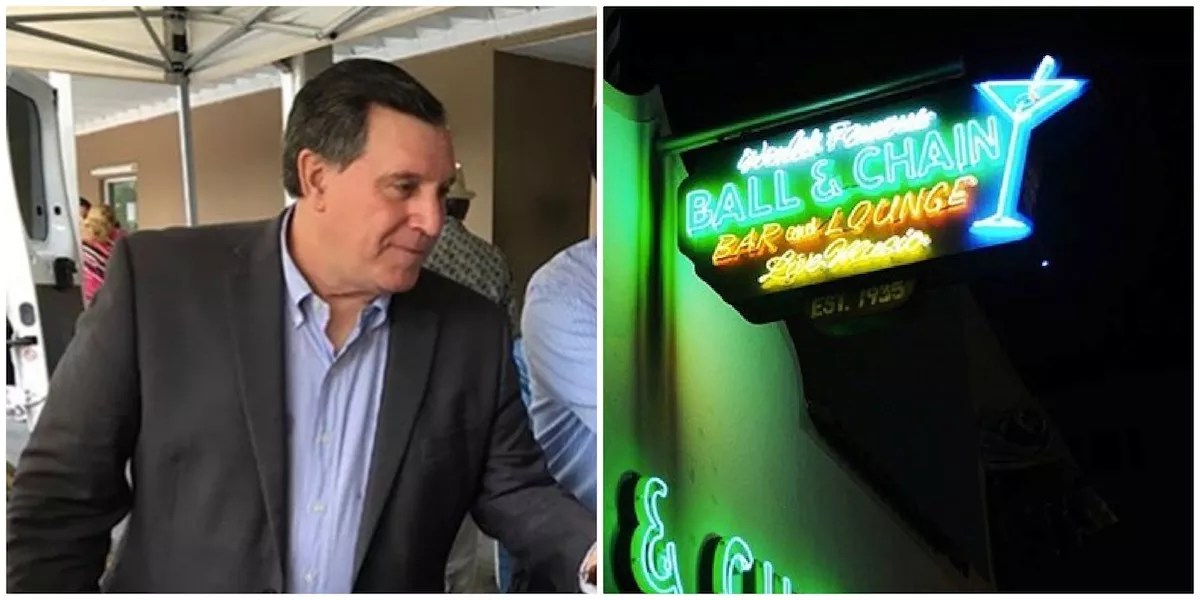
Photos via Commissioner Joe Carollo/Ball & Chain

Audio By Carbonatix
City of Miami commissioners dealt a crushing blow to Miami’s nightlife yesterday, unanimously passing an ordinance that will prohibit outdoor music at certain venues from 10 p.m. to 8 a.m. They did so without listening to more than eight hours of recorded comments from residents opposed to the proposal.
Local businesses that rely on outdoor music to attract late-night guests fought the ordinance, which was initiated by Commissioner Joe Carollo. Bill Fuller and Zack Bush, co-owners of the iconic Little Havana nightclub Ball & Chain, believe the ordinance is just the latest move by Carollo in his feud with the business after Fuller supported Carollo’s political opponent in 2017.
The city received more than eight hours of recorded public comment in opposition to the ordinance – much of it from supporters of Ball & Chain – but commissioners heard none of it.
On Tuesday, Ball & Chain asked its Instagram followers to call the city commission and voice their opposition to the ordinance. To make it easy, the club provided a suggested script.
City Attorney Victoria Méndez then claimed that of the 366 recorded voicemails and videos received by the city, all were substantially similar based on the script, and thus did not need to be played. She told commissioners yesterday that her office had consulted with Florida Attorney General Ashley Moody’s office about the city’s statutory requirement to play the recordings and was advised that the city did not need to play them because they contained the same scripted message.
So today, Miami commissioners will not listen to hours of recorded public comments because the city attorney said it's not necessary, citing an opinion from the attorney general. I've asked for this opinion and for each of those calls.
— Joey Flechas (@joeflech) November 19, 2020
But when New Times reached out to the attorney general’s office, a spokesperson said the office did not issue an official legal opinion on the matter, explaining that staff had merely had a general conversation with the Miami city attorney’s office.
Pat Gleason, special counsel for open government with the attorney general’s office, tells New Times she had a conversation with one of Méndez’s assistants about the recorded public comment but did not give any recommendations or official guidance.
“An assistant called regarding an issue with many video statements that were not possible to play all of. His question was what direction does the statute have on that issue, and it really has none,” Gleason says.
Gleason says the assistant, whose name she couldn’t remember, suggested that the city could read the content of the script into the record and convey the message. Gleason thought the suggestion was reasonable, but that was only her personal opinion.
“I’m always clear. Those were my personal thoughts, not the attorney general’s opinion or the official opinion of the office,” she says.
Kylie Mason, press secretary for the attorney general’s office, says she knows of no one else besides Gleason who spoke with someone from Méndez’s team.
During yesterday’s commission meeting, the content of the script was read aloud by city staff. The entirety of the recordings went otherwise ignored.
Fuller, the Ball & Chain owner, claims Méndez lied to the commission about the comments, saying there was no way all eight hours of comments repeated the same script verbatim.
“Many people called that did not receive the script. Méndez lied to the city, all of the residents, commissioners, everybody in there,” Fuller alleges. “They censored and edited what they thought was favorable and not favorable to the commission.”
An attorney for Ball & Chain sent a letter to the Florida attorney general’s office after the meeting, claiming that Méndez violated the freedom of speech of residents who submitted comments and asking the office to provide documentation supporting its position.
In the past, Méndez has been accused of siding with Carollo on his pet projects and issues. Emails obtained by Political Cortadito blogger Elaine de Valle showed that a group of attorneys led by Méndez worked to shield Carollo from an effort to recall him from his seat on the city commission.
The ordinance banning outdoor music late at night passed with a yes vote from all commissioners, including Ken Russell, who initially opposed the legislation. The Wynwood Neighborhood Revitalization District, part of which lies in Russell’s district, was exempted from the rule after some amendments, as was the Coconut Grove Business Improvement District, which Russell chairs.
Also amended: The original language of the ordinance, which would have prohibited music after 8 p.m. As passed by the city commission, the cutoff is now 10 p.m. for establishments that do not have a permit from the city. Those that had a permit before the ordinance was passed will be grandfathered in and can have outdoor music until 11 p.m.
Russell tells New Times he changed his vote on the ordinance once those changes were made.
“This was not the same ordinance that came in last week,” Russell says. “I wanted an analysis of those amendments and made sure the legislation wouldn’t affect businesses in my district.”
Fuller and Bush say they applied for an outdoor-activity permit for Ball & Chain a year ago but have yet to receive one from the city.
Fuller says he intends to bring up the new ordinance in his ongoing federal court case against Carollo for allegedly abusing his office as commissioner to harass Ball & Chain and infringing on Fuller’s First Amendment rights.